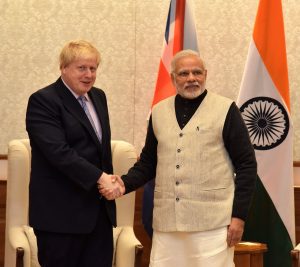According to Indian media reports, an India-United Kingdom military logistics agreement is in the final stages of preparation. Such as agreement – which India has with several countries, including Australia, Japan, and the United States – will allow both militaries to formalize sharing of services and supplies, including fuel, and facilities, leading to greater exchanges, more frequent joint exercises, and smoother port calls. While largely routine, these agreements have long carried symbolic weight for India, a country traditionally reluctant to enter formal military arrangements with other, especially Western, powers.
As some have already argued, for the United Kingdom such an agreement is equally laden with symbolism. As the U.K. firmly separates itself from the European Union come the first day of 2021, it increasingly seeks to project itself as a player with global interests and reach, a stated goal of the Boris Johnson government. By entering the Indo-Pacific fray – and deeper ties with India is a crucial component of this endeavor – the U.K. can position itself as a major power outside Europe. Such a move from London will also signal New Delhi it is no longer beholden to Pakistan — a function both of history as well as domestic politics, by virtue of a large, influential diaspora – or China.
But beyond symbolism lies the question of substance. As I recently wrote in these pages, it is unclear what India seeks out of umpteen maritime arrangements when, substantially, its naval reach remains limited and the military rationale for a greater push toward the seas unclear. While many – correctly – argue that logistics agreements allow the Indian Navy access to ports around the world, that only becomes meaningful if there is a concrete military strategy, one that holds in peace and war, underpinning such visits, beyond signaling to the world that India, too, is a global power.
Consider this. While the texts of the other logistics agreements India has signed so far remain classified, that is not the case when it comes to its “Acquisition and Cross-Servicing Agreement” (ACSA) with Japan. And from that document, we can clearly glean its scope, in terms of activities covered, is fairly circumscribed with no intrinsic guarantee India will have access to Japanese ports in event of, say, war with China. Even after the controversial 2014 re-interpretation of Article 9 of Japan’s constitution (which effectively commits the country to pacifism in perpetuity), it is unlikely the country will be involved in an India-China clash. (At the time of announcing his cabinet’s decision to re-interpret that article, then Prime Minister Abe Shinzo had declared Japan would not “become caught up in wars in order to defend foreign countries,” with the new commitment to collective defense kicking in only if Japan’s own survival was at stake.)
If the India-Japan ACSA is a faithful template for all other logistics agreements India has, it is clear these are all – despite media hysteria – peacetime agreements, perhaps with marginal signaling value even though they highlight India’s deepening political compact with the other parties.
Coming back to the U.K., the last four years have found London floundering, its political system in utter chaos despite Johnson and his predecessor’s brave face and boisterous pronouncements. Soon after the 2016 Brexit, sections in New Delhi and London became tremendously excited about the possibility of an India-U.K. free trade agreement — an idea which, while remaining on the table, is unlikely to materialize any time soon. (Faithful readers of The Diplomat will recollect India’s familiar hesitations and demands when it comes to free trade agreements in general.)
What direction the U.K. eventually settles on as a steady state, both when it comes to economics as well as strategy, won’t be a matter of policy ideation today, however grand. It’d be shaped by its material reality and attendant compulsions tomorrow. In effect, the United Kingdom’s global role will be determined by three simultaneous pressures: the U.S.-China strategic competition, the economic impact of the pandemic, as well as the long-term effects of its severance from the EU, both political as well as economic. Given we don’t know how the combined effect of all three will shape that country, it is best to hold our horses about the future of India-U.K. relations.

































